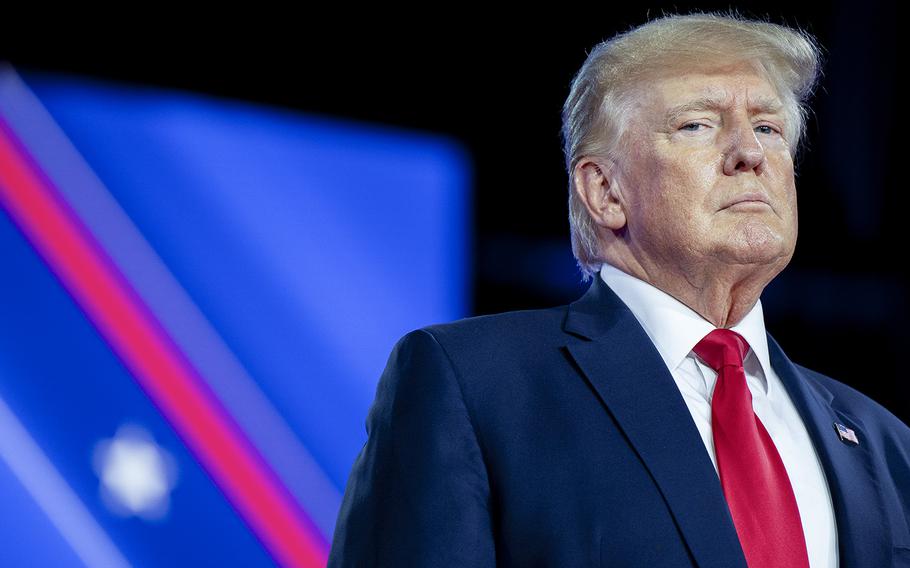
Former President Donald Trump prepares to speak at the Conservative Political Action Conference held at the Hilton Anatole on Aug. 6, 2022, in Dallas. (Brandon Bell/Getty Images/TNS)
(Tribune News Service) — Revelations that authorities seized classified material from Donald Trump are poised to shift the political ground ahead of U.S. midterm elections and a potential 2024 run by the former president.
Although the fallout from a remarkable week is just beginning, the search at Trump's resort in Florida is certain to seep into the November races that will determine party control of Congress, and it promises to keep a focus on Trump rather than inflation and other issues Republicans want to use against Democrats. It's also likely to affect the next presidential election.
Court documents unsealed by a judge Friday showed investigators removed classified and top secret materials from Mar-a-Lago on Monday and were searching for evidence of violations of three specific federal criminal laws, including one that's part of the Espionage Act.
While Trump said he had declassified the documents and the search was an unnecessary move by his political enemies to attack him, the escalating turmoil is poised to become an issue in midterms, which Republicans have been trying to make a referendum on President Joe Biden and rising prices to regain control of the House and Senate.
Republican strategist Doug Heye, a former communications director of the Republican National Committee and a Trump critic, said it would be "political malpractice" for Democrats not to use the issue against Republicans who have rallied behind Trump.
"This muddles the Republican message and gives Democrats another thing to push back on so they're not talking about the issues they don't want to talk about," Heye said.
The revelations show "the dangers of putting Trump and his accomplices in power," which will be top of mind for voters who see Republicans protecting Trump no matter what the cost, said longtime Democratic strategist Jesse Ferguson.
"This election isn't just about who's on your side, it's about who's on America's side," Ferguson said.
Trump and his supporters in the GOP — including Florida Gov. Ron DeSantis and other potential challengers for the GOP nomination in 2024 if the former president runs again — have called the raid politically motivated. They've sought to portray the former president as the victim of Democratic forces bent on preventing him from returning to power as in "banana republics."
The initial support is evidence of Trump's grip on the GOP, though some political strategists said Republicans might come to regret it if evidence surfaces showing that the search of a former president's home was clearly justified — especially if Trump ultimately faces charges.
FBI focus
There were signs some in the GOP could start to back away from Trump, including the conservative House Freedom Caucus canceling a press conference to criticize the search on Friday for scheduling reasons. That followed a Washington Post report on Thursday that one category of documents the FBI was looking for related to nuclear weapons.
The emphasis by the GOP on supporting law enforcement prompted "Fox & Friends" host Steve Doocy to grill House GOP Whip Steve Scalise on Thursday about "demonizing" the FBI doing its job. "Whatever happened to the Republican Party backing the blue?" Doocy said.
Trump continued to insist after the revelations that the search was politically motivated and there could be no crimes because he had declassified the records. He also said there was no need for a "raid" because he was cooperating with investigators.
"They didn't need to 'seize' anything," Trump said in a post on his Truth Social platform on Friday. "They could have had it anytime they wanted without playing politics and breaking into Mar-a-Lago."
Who can declassify?
Former federal prosecutor Barbara McQuade said Trump doesn't have the power to declassify documents on his own. A president can request or initiate a declassification, she said, but the original classifying agency "must undergo a process to complete the declassification."
Trump also floated the baseless suggestion that federal prosecutors could have planted evidence, and he falsely questioned the "33 million pages of documents, many of which are classified, that President [Barack] Obama took to Chicago."
The National Archives and Records Administration said in a statement it assumed legal and physical custody of the records when Obama left office. Records once were considered the property of a president, but that changed with the Presidential Records Act after Richard Nixon wanted to destroy Watergate-era documents.
Trump has sought to capitalize on the search in fundraising appeals, and supporters including former White House adviser Steve Bannon have called for him to respond to the FBI search by immediately announcing he's running in 2024.
But there are reasons for Trump to wait, including the escalating investigation into the potential handling of classified materials as well as the other probes he faces, and strategists said the revelations could embolden potential 2024 Republican candidates who had been supporting Trump for fear of crossing his loyal base.
___
©2022 Bloomberg L.P.
Visit bloomberg.com.
Distributed by Tribune Content Agency, LLC.